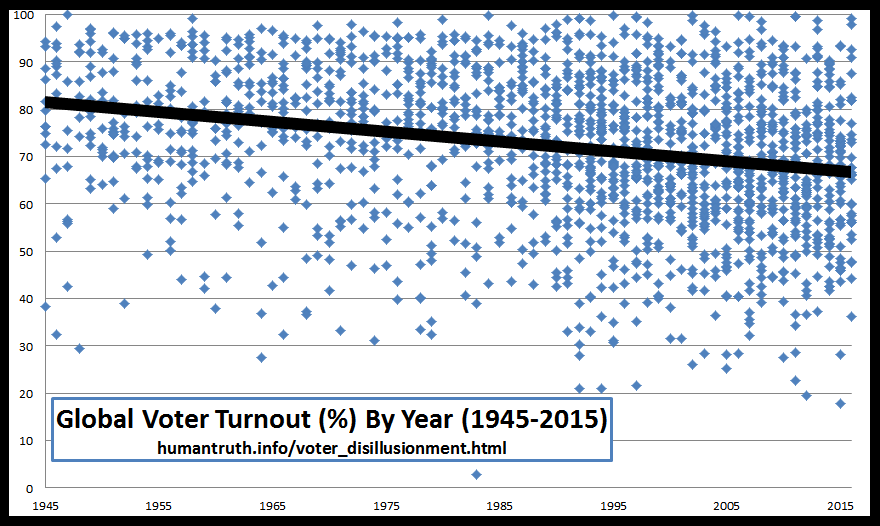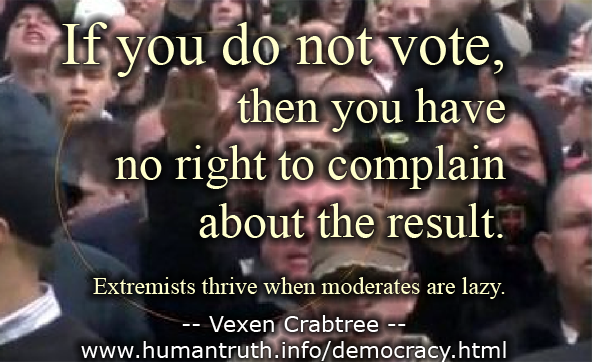Democratic Disillusionment and Voter Apathy
https://www.humantruth.info/voter_disillusionment.html
By Vexen Crabtree 2016
#democracy #democracy_challenges #extremism #politics #USA #voter_apathy #voting
Most developed democracies have seen a continual decline in the numbers of people who vote in elections and referendums, and a loss of trust in politics in general1,2. In a survey of 10 large European countries in 2017 found that of 42 main political parties nearly all were viewed mostly negatively by everyone3. Only 5 done well4. Also "most Western European countries have seen large falls in party membership in recent decades"5. It is a "warning sign" when political parties do not attract support1 and low turnouts at polling booths is eroding their legitimacy6. It is possible that this isn't a result of malaise, but of progress: the 19th century political theorist Tocqueville followed the 18th century Montesquieu in predicting that as liberty and economic freedom become entrenched, people would become energized in the private sphere and no longer participate in public affairs7. But most analysts are concerned that the direct-vote mandate has been undermined by disinterest and disillusionment1. The decline since the 1960s in all European countries' voter turnout rates has followed the USA's lead, although some recent elections have seen this trend halted. It is unfortunate that those who are most often motivated to vote are those with very particular and sometimes extremist views. Their good voting record means that they bear undue and unfair pressure on the political system. The academic Frank Furedi pointed out in 2004 that it has become commonplace that more people vote to choose the remaining cast of Big Brother than who vote to elect our leaders for the next three years8. In an irresponsible and childish world, entertainment has become more important than good governance. To restore balance, more moderates and "ordinary people" need to vote.

Source:9

“The evidence indicates a general pattern of declining public confidence in [old democracies] over the past fifteen years, and in some cases much longer. The evidence comes from three sources. First, public opinion surveys demonstrate "a general erosion in support for politicians and political institutions in most advanced industrial democracies". In the case of the USA, this erosion goes back a long way: whereas in 1966 forty-one per cent of the population had "a great deal of confidence" in the presidency, and forty-two per cent in Congress, by 1996 these figures had fallen to thirteen per cent and five per cent respectively. A second source of evidence comes from declining voter turnouts in national elections. In the USA, these have rarely risen above fifty per cent in any case. [...] A third source of evidence comes from the decline in membership of political parties.”
"Democracy: A Beginner's Guide" by Beetham, David (2005)1
Further topics:
1. The Unpopularity of the EU10
#brexit #EU #europe #greece #politics #popularism
The EU goes through phases of unpopularity11. At various times in history, the loudest anti-EU voices were communists and mavericks; but from year 2000 it became anti-establishment and popularist right-wing movements that shout loudest about the EU12 (as well as those who pander to xenophobia and anti-globalism). In many developed countries there is a loss of interest in politics and very few political systems are seen positively, including the EU13. Part of the reason is that a long period of peace between EU members has made it hard to remember11,14 what it was like when wars, tariff races, travel restrictions and dozens of currencies all damaged quality of life. Without those common enemies, the EU itself has become a scapegoat for many national issues, with politicians using anti-EU rhetoric to hide governmental failures14, and cheap mass-media outlets selling newspapers with ridiculous and ill-informed articles about the EU. Many (knowing even less about the EU than they do about their own governments) are taken in by such claims.
Despite all that, since 2017, the EU has seen a sharp rise in popularity as the spectacle of Brexit has reminded many people of the advantages of membership15. Although the EU remains as unpopular as other political institutions, even in the most skeptical country, Greece, few people want to actually leave it (36%). In 2017, only around 18% of the EU population wished to leave15.
For more, see:
2. The United Kingdom
"The 1999 UK elections to the European Parliament brought a turnout of 23 per cent - and in one Sunderland polling station, only 15 people turned up out of the 1000 entitled to vote"6. In the next General Election in 2001, voter apathy was one of the top issues under national debate and still "the turnout was an all-time low of 59 per cent"6. In 2005 political theorist David Beetham pointed out that over the preceding 20 years, UK political party membership had dropped by half1 and "the UK now has one of the lowest rates of party membership in Europe"16 (in 2015).
“Identification with political parties has declined over the past thirty years: the 32nd British Attitudes Survey found that in 2014 37% of people identified very or fairly strongly with a political party, compared with 46% in 1987.”
"Membership of UK Political Parties" by Richard Keen (2015)16
The result is that extremist parties (of the horrible, ignorant, racist and apolitical kind) have found it easy to gain influence, power, and press coverage. As the country loses interest in the technicalities and complexities of good governance, those spokespeople who speak with simplistic one-liner arguments have become the loudest voices. As the moderates remain apathetic, quiet and lazy, the country is making leaps and bounds backwards towards nationalism, bigotry and apolitical nonsense. Things are probably going to get worse before we regain the good sense to get involved in politics again.